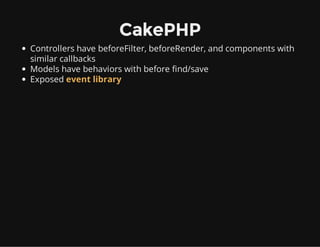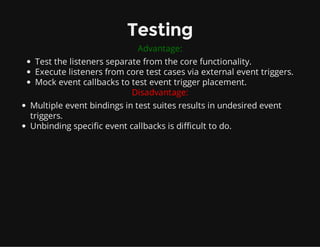Event driven application
- 2. Chris?Saylor Lead Engineer @cjsaylor 150+ countries 14 million weekly class participants 15 million monthly pageviews 47 million monthly service requests Zumba?Fitness
- 3. What?to?expect What are cross-cutting concerns? Origins from Observer pattern Asynchronous vs Synchronous Logic abstraction Demo Events in the wild Advantages and drawbacks Futher considerations
- 5. Cross-cutting concerns are parts of a program that rely on or must affect many other parts of the system. Source: Wikipedia.org
- 6. Examples?of?cross-cutting?concerns Logging Caching Product feature interaction Monitoring Record audit trail State Management
- 7. What?are?the?risks?of?cross?cutting concerns? Coupling systems too tightly (aka "Tangling") Lots of code duplications (aka "Scattering")
- 8. Single?Responsibility?Principle If a class and its services should be responsible for one thing, how do we deal with unrelated business rules that must be addressed by that class?
- 10. Observer?Pattern The root of Event Driven Applications began with the observer pattern which tracks the state of a subject by attaching observers to the subject so that when it changes, all observers are notified.
- 11. SplObserver The interface is a standard lib to implement this pattern. SplObserver An SplSubject object attaches the observer. The SplSubject then calls an update on the observer when notifying the registered observers.
- 13. App?event?in?javascript Syncronous in order of execution Asyncronous in order of completion $('p') .on('click', function() { (function() { console.log('first?'); }()); }) .on('click', function() { (function() { console.log('second?'); }()); });
- 14. App?event?in?PHP Syncronous Predictable order of execution and completion <?php $event ->on('event1', function() { echo "First!"; }) ->on('event1', function() { echo "Second." });
- 16. Separation?of?Concerns Use synchronous events to separate chunks of business logic away from core functionality Provides for modularity Allow for unit testing listeners Multiple messages - multiple listeners
- 17. Example?Before <?php function login($username, $password) { try { // get user from db $user = Repository::get($username, $password); // Check if an admin if ($user->role->admin) { $_SESSION['admin'] = true; } // Log user's login $user->updateLastLogin(time()); Repository::saveUser($user); } catch (Exception $e) { return false; } return true; }
- 18. Example?After <?php function login($username, $password) { try { // get user from db $user = Repository::get($username, $password); // Fire post login event $event::trigger('afterLogin', compact('user')); } catch (Exception $e) { return false; } return true; <?php $event::listen('afterLogin', function($event) { if ($event->data['user']->role->admin) { $_SESSION['admin'] = true } }); $event::listen('afterLogin', function($event) { $event->data['user']->updateLastLogin(time()); Repository::saveUser($event->data['user']); });
- 21. CakePHP Controllers have beforeFilter, beforeRender, and components with similar callbacks Models have behaviors with before find/save Exposed event library
- 22. Symfony?2 can be used as a standalone event library. Can be easily incorporated via Composer EventDispatcher
- 23. Zend can be used to create events and listeners of said events Can be extracted from Zend, but not as easily as Symfony 2. EventManagers
- 26. Decouple?Code Advantage: Modular design can reduce core functionality bugs when modifying modules. Allows for open frameworks to allow third parties to implement custom solutions without modifying core files. Disadvantage: Code is harder to follow and needs good organizational management. Documentation of what events will be called when is almost a must.
- 27. Plugin?Architecture Advantage: Enable or disable plugins on the fly. Essential for open source targeting developers to implement. Disadvantage: No dependencies should exist be between plugins.
- 28. Testing Advantage: Test the listeners separate from the core functionality. Execute listeners from core test cases via external event triggers. Mock event callbacks to test event trigger placement. Disadvantage: Multiple event bindings in test suites results in undesired event triggers. Unbinding specific event callbacks can be difficult to do.
- 30. Synchronous?or Asynchronous? Make a judgment on whether an event listener should process it now or post-request process with a call to a message queue.
- 31. Events?and?Variable?Reference Using an object for passage into the event so all event handlers have access to the same data.
- 32. Specialization Is the logic I'm trying to abstract into an event worth doing so? Would this logic best be housed in the core logic?
- 33. Further?Reading Using application events to hook in plugins Decoupling applications with domain events Domain Events
- 34. Thank?you Get this presentation on slideshare: http://www.slideshare.com/cjsaylor/event-driven-application



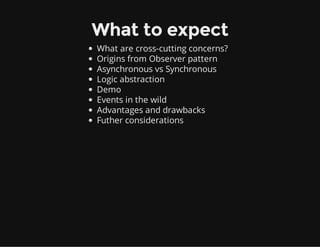


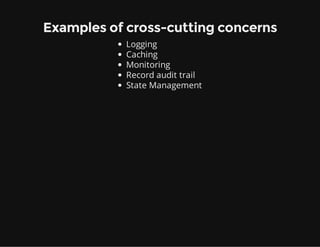
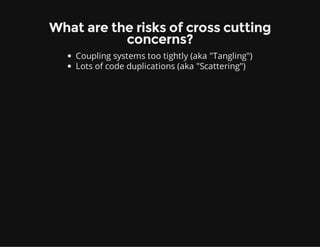

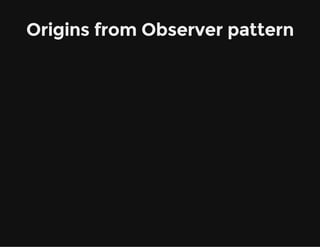
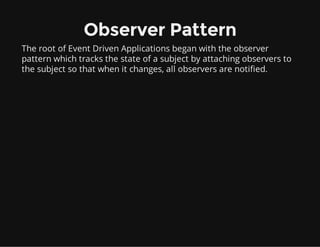


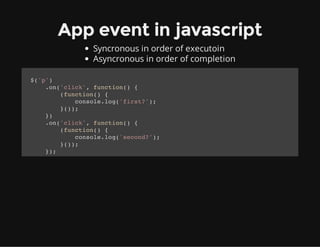
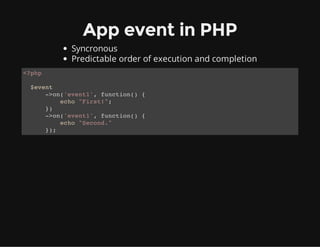

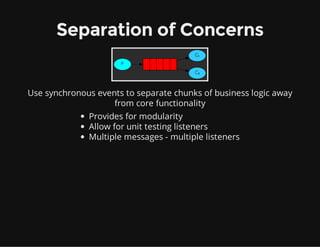
![Example?Before
<?php
function login($username, $password) {
try {
// get user from db
$user = Repository::get($username, $password);
// Check if an admin
if ($user->role->admin) {
$_SESSION['admin'] = true;
}
// Log user's login
$user->updateLastLogin(time());
Repository::saveUser($user);
} catch (Exception $e) {
return false;
}
return true;
}](https://image.slidesharecdn.com/eventdrivenprogramming-130604153818-phpapp01/85/Event-driven-application-17-320.jpg)
![Example?After
<?php
function login($username, $password) {
try {
// get user from db
$user = Repository::get($username, $password);
// Fire post login event
$event::trigger('afterLogin', compact('user'));
} catch (Exception $e) {
return false;
}
return true;
<?php
$event::listen('afterLogin', function($event) {
if ($event->data['user']->role->admin) {
$_SESSION['admin'] = true
}
});
$event::listen('afterLogin', function($event) {
$event->data['user']->updateLastLogin(time());
Repository::saveUser($event->data['user']);
});](https://image.slidesharecdn.com/eventdrivenprogramming-130604153818-phpapp01/85/Event-driven-application-18-320.jpg)


